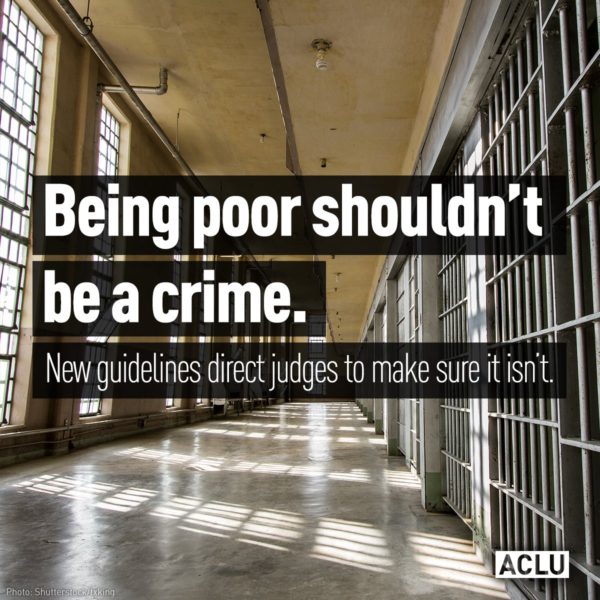

The Department of Justice announced a package of resources to assist state and local efforts to reform harmful and unlawful practices in certain jurisdictions related to the assessment and enforcement of fines and fees. The resources are meant to support the ongoing work of state judges, court administrators, policymakers and advocates in ensuring equal justice for all people, regardless of financial circumstance.
“The consequences of the criminalization of poverty are not only harmful – they are far-reaching,” said Attorney General Loretta E. Lynch. “They not only affect an individual’s ability to support their family, but also contribute to an erosion of our faith in government. One of my top priorities as Attorney General is to help repair community trust where it has frayed, and a key part of that effort includes ensuring that our legal system serves every American faithfully and fairly, regardless of their economic status.”
The package, which was sent to state chief justices and state court administrators throughout the country, includes the following elements:
- Dear Colleague Letter from the Civil Rights Division and the Office for Access to Justice to provide greater clarity to state and local courts regarding their legal obligations with respect to the enforcement of court fines and fees. The letter addresses some of the most common practices that run afoul of the U.S. Constitution and/or other federal laws, such as incarcerating individuals for nonpayment without determining their ability to pay. The letter also discusses the importance of due process protections such as notice and, in appropriate cases, the right to counsel; the need to avoid unconstitutional bail practices; and due process concerns raised by certain private probation arrangements.
- $2.5 million in competitive grants through the Bureau of Justice Assistance (BJA) to state, local or tribal jurisdictions that, together with community partners, want to test strategies to restructure the assessment and enforcement of fines and fees. The grant program, titled The Price of Justice: Rethinking the Consequences of Justice Fines and Fees, will provide four grants of $500,000 to agencies and their collaborative partners to develop strategies that promote appropriate justice system responses, including reducing unnecessary confinement, for individuals who are unable to pay fines and fees. BJA will award an additional grant of $500,000 to a technical assistance provider. For agencies interested in applying for this funding opportunity, BJA will host an informational webinar on March 28, 2016, at 11:30 a.m. EDT to describe the background, key concepts and requirements of the solicitation. To register, please follow this link(link is external).
- Support for the National Task Force on Fines, Fees and Bail Practices, which is led by the Conference of Chief Justices and the Conference of State Court Administrators. The task force is being funded by BJA and is also supported by the State Justice Institute. It is comprised of leaders from the judiciary, state and local government, the advocacy community and the academy. The task force will draft model statutes, court rules and procedures, and will develop an online clearinghouse of best practices. Department officials will also serve as ex officio members of the task force.
- Resource Guide that assembles issue studies and other publications related to the assessment and enforcement of court fines and fees. The resource guide, compiled by the Office of Justice Programs Diagnostic Center, helps leaders make informed policy decisions and pursue sound strategies at the state, local and tribal levels.
Today’s announcement follows a seminal two-day convening(link is external) held by the Justice Department and the White House in Washington, D.C., on Dec. 2 and 3, 2015. Judges, court administrators, researchers, advocates, prosecutors, defense attorneys and impacted individuals came together to discuss challenges surrounding fines and fees. The convening made plain the existence of unlawful and harmful practices in some jurisdictions and highlighted a number of promising reform efforts already underway. At the meeting, participants and department officials also discussed ways in which the Justice Department could assist courts in their efforts to make needed changes. Participants specifically asked the department to provide legal guidance to state and local actors; to highlight and help develop model practices; and to provide resources for local reform efforts.
The Justice Department is committed to reforming justice-system practices that perpetuate poverty and result in unnecessary deprivations of liberty. The department discussed many of these practices in its March 2015 report on the investigation of the Ferguson, Missouri, police department and municipal court. As discussed at the December 2015 convening, however, these practices can be found throughout the nation. And their effects are particularly severe for the most vulnerable members of our communities, often with a disproportionate impact on racial minorities. The resources released today are aimed at reforming these practices and mitigating their harmful effects.
Source: DOJ 2016
more recommended stories
 Fentanyl Seizures at Border Continue to Spike, Making San Diego a National Epicenter for Fentanyl Trafficking
Fentanyl Seizures at Border Continue to Spike, Making San Diego a National Epicenter for Fentanyl TraffickingFentanyl Seizures at Border Continue to.
 Utah Man Sentenced for Hate Crime Attack of Three Men
Utah Man Sentenced for Hate Crime Attack of Three MenTuesday, August 8, 2023 A.
 Green Energy Company Biden Hosted At White House Files For Bankruptcy
Green Energy Company Biden Hosted At White House Files For BankruptcyAug 7 (Reuters) – Electric-vehicle parts.
 Former ABC News Reporter Who “Debunked” Pizzagate Pleads Guilty of Possessing Child pδrn
Former ABC News Reporter Who “Debunked” Pizzagate Pleads Guilty of Possessing Child pδrnFriday, July 21, 2023 A former.
 Six Harvard Medical School and an Arkansas mortuary Charged With Trafficking In Stolen Human Remains
Six Harvard Medical School and an Arkansas mortuary Charged With Trafficking In Stolen Human RemainsSCRANTON – The United States.
 Over 300 People Facing Federal Charges For Crimes Committed During Nationwide Demonstrations
Over 300 People Facing Federal Charges For Crimes Committed During Nationwide DemonstrationsThe Department of Justice announced that.
